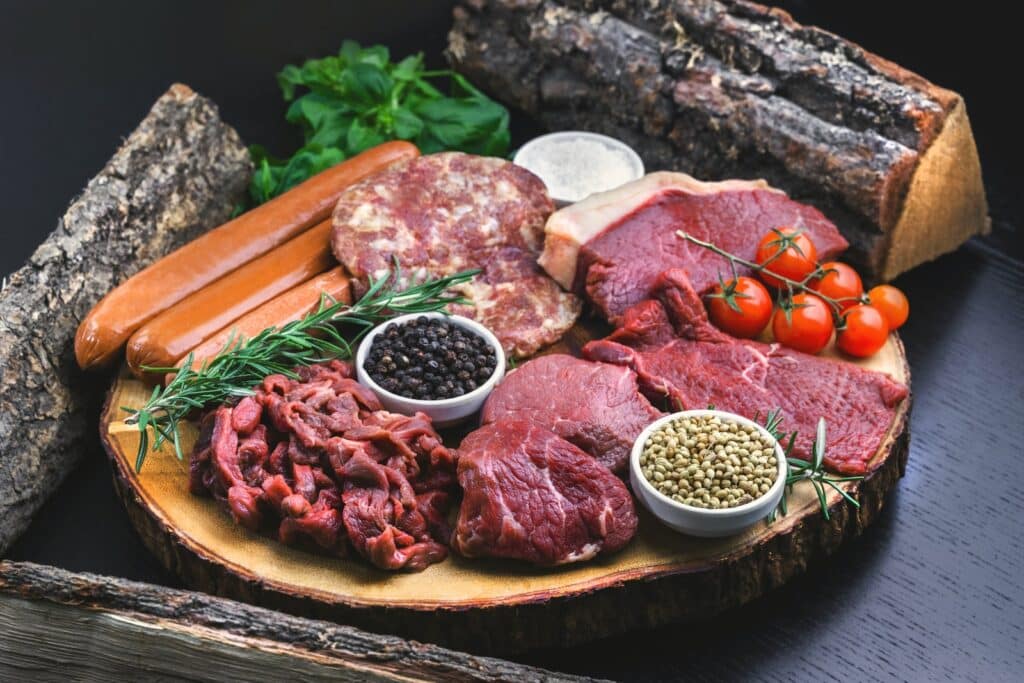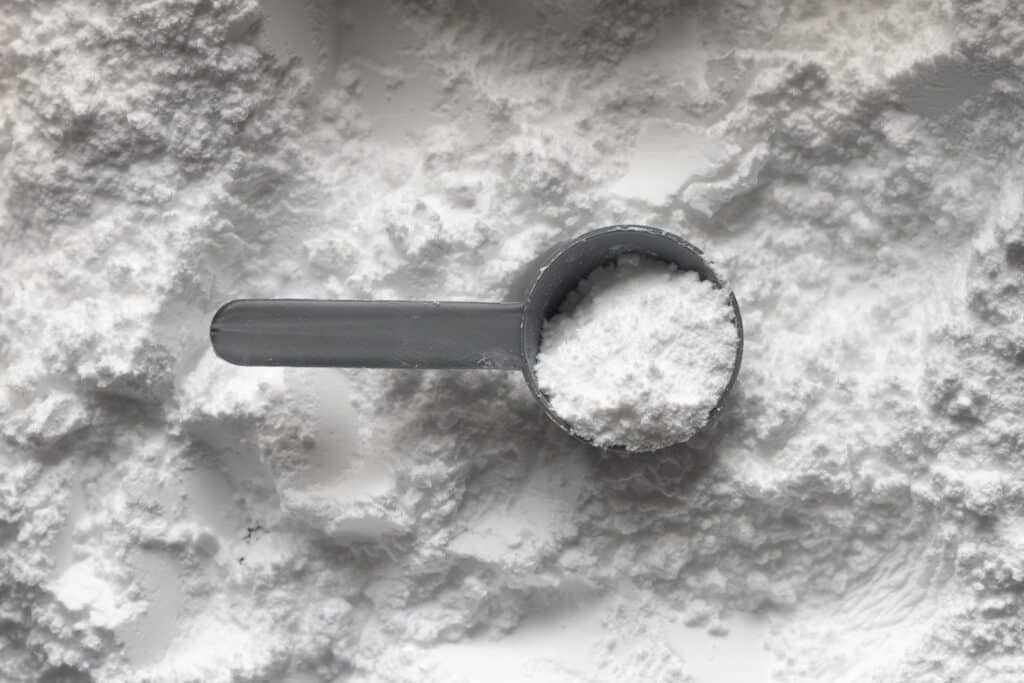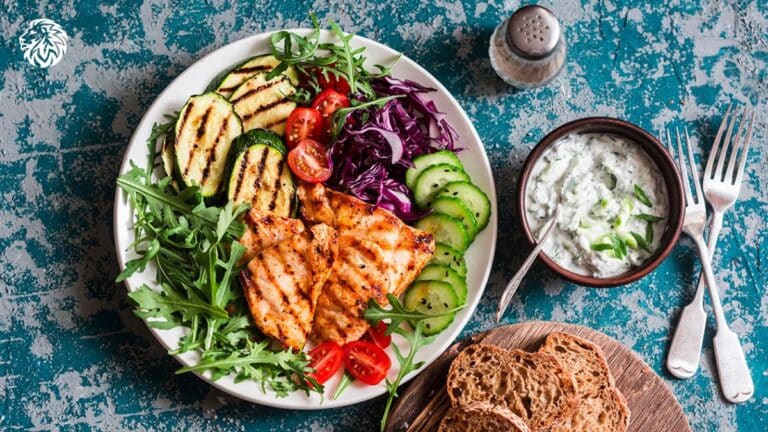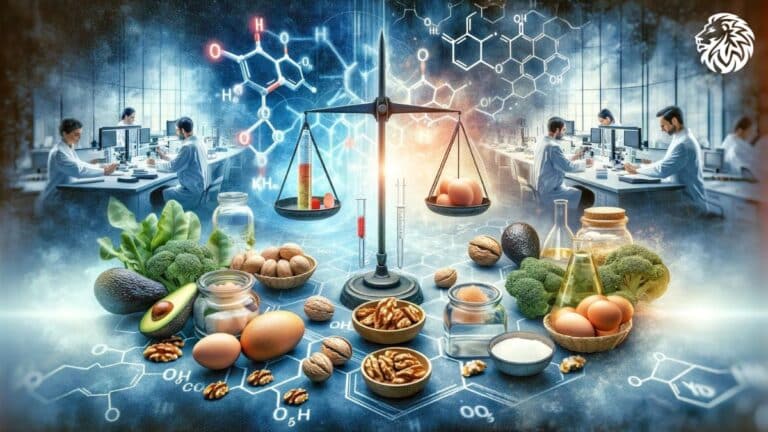Building muscle isn’t just about lifting weights or doing countless push-ups; it’s also about what you put on your plate. Nutrition plays a pivotal role in muscle building, acting as the fuel that powers your body through tough workouts and the building blocks that repair and grow your muscles post-exercise. While there’s no one-size-fits-all diet for muscle gain, certain nutritional principles can significantly enhance your muscle-building efforts.
This article outlines ten essential nutrition rules that are key to maximizing muscle growth. These guidelines are designed to work in synergy with your workout routine. They’re not standalone solutions but rather a part of a comprehensive approach that includes adequate exercise, rest, and overall lifestyle choices. By understanding and implementing these nutrition strategies, you can optimize your muscle-building potential and see tangible results from your fitness endeavors.
Rule 1: Prioritize Protein

Protein is often hailed as the cornerstone of a muscle-building diet for good reason. It’s the primary building block for muscle tissue, playing a crucial role in both the repair of muscle fibers damaged during exercise and the growth of new muscle tissue. When you work out, especially during weight training or resistance exercises, your muscle fibers undergo micro-tears. Protein steps in to repair these tears, leading to muscle growth and increased strength over time.
However, not all proteins are created equal. Complete proteins, which contain all nine essential amino acids that your body can’t produce on its own, are particularly important. Good sources of complete proteins include:
- Animal-Based Proteins: Chicken, turkey, beef, pork, fish, eggs, and dairy products.
- Plant-Based Proteins: Quinoa, soy products (like tofu and tempeh), and buckwheat.
For those who follow a vegetarian or vegan diet, combining different plant-based protein sources is crucial to ensure a complete amino acid profile.
As for the daily intake, it varies based on individual factors like age, gender, weight, and the intensity of your workout regimen. A general guideline is to consume around 1.6 to 2.2 grams of protein per kilogram of body weight if you’re actively trying to build muscle. This intake should be spread out over the course of the day, ideally with a source of protein included in every meal and snack, to maintain a constant supply of amino acids to your muscles.
By prioritizing protein in your diet, you’re laying a strong foundation for muscle growth, ensuring that your body has the necessary components to build and repair muscle effectively.
Rule 2: Don’t Fear Carbohydrates

Carbohydrates often get a bad rap in diet culture, but they’re actually essential, especially when it comes to building muscle. Carbs are your body’s primary energy source, fueling everything from brain function to intense workouts. They are particularly important for muscle recovery and growth. During exercise, your body uses glycogen, a form of carbohydrate stored in your muscles, for energy. Post-workout, your muscles are depleted of glycogen, and consuming carbs helps replenish these stores, aiding in recovery and growth.
It’s important to focus on the right types of carbohydrates for muscle building:
- Complex Carbohydrates: These are key for sustained energy. Foods like whole grains (brown rice, quinoa, oats), starchy vegetables (sweet potatoes, corn, peas), and legumes (beans, lentils) provide not only carbs but also fiber, vitamins, and minerals.
- Simple Carbohydrates: While often considered less healthy due to their quick digestion and impact on blood sugar levels, simple carbs (found in fruits, honey, dairy products) can be beneficial post-workout. They provide a quick energy source, aiding in faster glycogen replenishment.
Timing of carbohydrate intake can also play a role. Consuming carbs before a workout can provide the energy needed for a high-intensity session, while post-workout carbs aid in recovery and muscle repair. It’s also recommended to pair carbs with protein after a workout for optimal muscle recovery.
The amount of carbohydrates one should consume varies depending on the individual’s total caloric needs, goals, and types of training. However, a general guideline for those focusing on muscle building is to make carbs about 40-60% of their total caloric intake. This ensures that the muscles have enough fuel for both performance and recovery.
In summary, don’t shy away from carbohydrates. Embrace them as a vital component of your muscle-building diet, focusing on high-quality sources and smart timing to maximize their benefits.
Rule 3: Incorporate Healthy Fats

The role of fats in a muscle-building diet is often underrated, yet they are essential for optimal health and muscle growth. Fats play a significant role in hormone production, including testosterone and growth hormone, which are crucial for muscle growth and repair. Additionally, fats are vital for the absorption of fat-soluble vitamins (A, D, E, and K), which are important for overall health and well-being.
When it comes to incorporating fats into your diet, focus on healthy sources. These include:
- Omega-3 Fatty Acids: Found in fatty fish like salmon, mackerel, and sardines, as well as flaxseeds, chia seeds, and walnuts. Omega-3s are known for their anti-inflammatory properties, which can aid in muscle recovery and joint health.
- Monounsaturated Fats: Avocados, nuts (like almonds and cashews), and olive oil are excellent sources. These fats help maintain good cholesterol levels and support heart health.
- Polyunsaturated Fats: Found in sunflower seeds, sesame seeds, and certain fish oils. These fats contribute to overall cell health and function.
While it’s important to include healthy fats in your diet, moderation is key. Fats are calorie-dense, so they should be consumed in accordance with your overall caloric needs. Generally, fats should make up about 20-35% of your total daily caloric intake.
Avoid or limit intake of trans fats and excessive saturated fats, commonly found in processed and fried foods, as they can negatively impact heart health and overall wellness.
Healthy fats are a crucial component of a muscle-building diet. They support hormone production, aid in nutrient absorption, and contribute to overall health. By choosing the right types and amounts of fats, you can effectively support your muscle growth goals while maintaining good health.
Rule 4: Stay Hydrated

Hydration is a critical, yet often overlooked, element in muscle building and overall athletic performance. Water makes up a significant portion of muscle tissue and plays a key role in many bodily functions that affect muscle growth and recovery.
Impact of Hydration on Muscle Performance and Recovery:
- Muscle Function: Adequate hydration is essential for maintaining muscle strength, power, and endurance. Dehydration can lead to a significant decrease in physical performance.
- Nutrient Transportation: Water helps transport nutrients to your muscles, crucial for growth and repair.
- Waste Removal: It aids in flushing out metabolic waste products that accumulate during intense workouts, speeding up the recovery process.
- Joint Lubrication: Proper hydration ensures that your joints are well-lubricated, reducing the risk of injury during weight lifting or resistance training.
Guidelines for Adequate Water Intake:
The amount of water needed can vary greatly depending on factors like your body size, the intensity of your workouts, and the environment (hotter climates or heated workout environments may require more hydration). However, general guidelines suggest:
- For Men: About 3.7 liters (125 ounces) of fluids a day from all beverages and foods.
- For Women: About 2.7 liters (91 ounces) of fluids a day from all beverages and foods.
These recommendations are for average adults living in temperate climates. Athletes or those engaged in heavy exercise may need more. A good rule of thumb is to drink water consistently throughout the day and especially:
- Before Exercise: Drink about 500 ml (17 ounces) of water two hours before intense exercise to ensure adequate hydration.
- During Exercise: Continuously sip water to replace fluids lost by sweating.
- After Exercise: Drink enough to replace any body weight lost during exercise.
Paying attention to the color of your urine is a simple way to gauge your hydration status. Aim for a light straw color; darker urine can indicate dehydration.
Staying well-hydrated is crucial for optimal muscle performance and recovery. Adequate water intake supports every step of the muscle-building process, from nutrient delivery to waste removal and recovery.
Rule 5: Timing Your Meals

Meal timing is an important aspect of a nutrition strategy aimed at building muscle. It’s not just about what you eat, but also when you eat it. Properly timed meals can optimize muscle growth, enhance workout performance, and speed up recovery.
Effect of Meal Timing on Muscle Growth:
- Muscle Protein Synthesis: Regularly spaced protein intake throughout the day can enhance muscle protein synthesis, an essential process for muscle growth.
- Energy Levels: Proper meal timing ensures that you have the necessary energy for your workouts and aids in recovery afterward.
Pre-Workout Nutrition Strategies:
- Timing: Eat a balanced meal 2-3 hours before exercising. If that’s not possible, a smaller meal or snack 30-60 minutes before can also work.
- What to Eat: Focus on a mix of carbohydrates (for energy) and protein (for muscle repair and growth). Examples include a banana with a small amount of peanut butter, a piece of toast with egg, or a smoothie made with fruit and a scoop of protein powder.
Post-Workout Nutrition Strategies:
- Timing: Aim to eat within 45 minutes to an hour after your workout. This time frame is often considered an anabolic window when your muscles are particularly receptive to nutrients.
- What to Eat: This meal should be rich in protein, to aid in muscle repair, and carbohydrates, to replenish glycogen stores. Good options include a protein shake, a chicken and vegetable stir-fry with brown rice, or Greek yogurt with fruit and nuts.
It’s important to note that while meal timing can contribute to muscle growth and recovery, the overall quality and quantity of your diet throughout the day are also crucial. No specific meal or snack can compensate for a diet that’s lacking in essential nutrients or not aligned with your muscle-building goals.
In summary, strategically timing your meals around your workouts can optimize muscle protein synthesis, improve performance, and enhance recovery. This approach, coupled with a balanced diet throughout the day, will support your muscle-building efforts.
Rule 6: Micronutrients Matter

While macronutrients like proteins, carbs, and fats often steal the spotlight in muscle-building diets, micronutrients – vitamins and minerals – are equally crucial. These nutrients play vital roles in various bodily functions, including those necessary for muscle growth and recovery.
Importance of Vitamins and Minerals in Muscle Building:
- Supporting Muscle Function: Certain vitamins and minerals are essential for muscle contraction, energy production, and the synthesis of muscle proteins.
- Aiding in Recovery and Repair: Micronutrients are involved in processes that repair muscle damage and reduce inflammation post-exercise.
- Overall Health: They contribute to the immune system, bone health, and other bodily functions that, while not directly related to muscle growth, are essential for maintaining the overall health necessary for rigorous training.
Best Food Sources for Essential Micronutrients:
- Vitamin D: Important for bone health and muscle function. Found in fatty fish like salmon and mackerel, fortified foods, and exposure to sunlight.
- Calcium: Essential for muscle contractions and bone strength. Sources include dairy products, fortified plant milks, leafy green vegetables, and almonds.
- Iron: Crucial for oxygen transport in the blood. Found in red meat, poultry, fish, legumes, and leafy greens.
- Magnesium: Plays a role in muscle function and energy production. Sources include nuts, seeds, whole grains, and leafy green vegetables.
- Potassium: Important for muscle function and recovery. Bananas, oranges, potatoes, and spinach are good sources.
- B Vitamins (B6, B12, Folate): Involved in energy production and the formation of red blood cells. Found in meats, eggs, whole grains, and fruits.
To ensure an adequate intake of these micronutrients, focus on a diet that includes a variety of foods. Fruits, vegetables, lean proteins, whole grains, nuts, and seeds are all important components of a diet that supports muscle building and overall health.
While supplements can help fill gaps in your diet, it’s generally best to get these micronutrients from whole food sources, as they offer a complex nutritional profile that supplements can’t replicate.
Micronutrients, though required in smaller amounts than macronutrients, are essential for muscle building and overall health. A diverse and balanced diet will help ensure that you get an adequate supply of these vital nutrients.
Rule 7: Supplement Smartly

Supplements can be a valuable addition to a muscle-building diet, especially when your nutritional needs are not fully met through food alone. However, it’s important to choose and use them wisely.
Beneficial Supplements for Muscle Building:
- Whey Protein: A convenient source of high-quality protein, whey protein is effective for promoting muscle growth and repair, especially when consumed post-workout.
- Branched-Chain Amino Acids (BCAAs): Comprising leucine, isoleucine, and valine, BCAAs are essential amino acids that can enhance muscle growth and reduce muscle soreness.
- Creatine: Well-researched and proven to increase muscle strength and size, creatine also helps in improving performance in high-intensity exercise.
- Omega-3 Fatty Acids: Beneficial for joint health and inflammation reduction, which can be particularly useful for those engaged in heavy training.
- Vitamin D and Calcium: Important for bone health and muscle function, these supplements are especially useful in individuals with limited sun exposure or dietary intake.
- Multivitamins: Useful for filling nutritional gaps, but they shouldn’t replace a balanced diet.
Advice on Choosing and Using Supplements Effectively:
- Quality Over Quantity: Look for supplements with minimal additives and from reputable brands. Third-party testing and certification can be a good indicator of quality.
- Tailor to Your Needs: Choose supplements based on your specific dietary requirements and fitness goals. For instance, plant-based athletes might benefit more from a vegan protein supplement.
- Timing Matters: Some supplements are more effective when taken at specific times. For example, whey protein and BCAAs are often most effective when consumed post-workout.
- Consult a Professional: Before starting any supplement regimen, especially if you have health conditions or are on medication, consult a healthcare professional or a registered dietitian.
Remember, supplements should complement, not replace, a nutritious diet. They are most effective when used in conjunction with a balanced diet and a consistent workout routine. The foundation of muscle building is still a well-rounded diet; supplements simply provide additional support.
Rule 8: Avoid Processed Foods

Processed foods, while convenient, can be detrimental to your muscle-building goals and overall health. These foods are often high in unhealthy fats, sugars, and sodium, and low in essential nutrients needed for muscle growth and recovery.
Impact of Processed Foods on Muscle Growth and Overall Health:
- Nutrient Deficiency: Processed foods are generally low in the vital nutrients needed for muscle building, like high-quality protein, vitamins, and minerals.
- Excess Calories: They are often calorie-dense but not filling, leading to excess calorie intake without the corresponding nutritional benefits, potentially leading to unwanted fat gain.
- Inflammation: Many processed foods contain additives and ingredients that can cause inflammation in the body, hindering muscle recovery and overall health.
- Energy Fluctuations: High in refined sugars, processed foods can cause spikes and crashes in blood sugar levels, affecting energy levels and workout performance.
Tips for a Clean, Muscle-Building Diet:
- Focus on Whole Foods: Base your diet around natural, minimally processed foods like fruits, vegetables, whole grains, lean proteins, and healthy fats.
- Read Labels: When you do buy packaged foods, read the labels. Look for products with short ingredient lists and recognizable ingredients.
- Prepare Meals in Advance: Meal prepping can help you avoid the convenience of processed foods. Cook in bulk and have healthy options readily available.
- Limit Added Sugars and Sodium: Cut back on foods high in added sugars and sodium, which are common in processed foods.
- Hydrate Wisely: Choose water or herbal teas over sugary drinks and sodas.
- Experiment with Cooking: Try new recipes and cooking methods to keep your diet interesting and varied.
By reducing your intake of processed foods and focusing on whole, nutrient-dense foods, you provide your body with the necessary tools for muscle growth and maintenance, as well as overall health. This approach not only benefits your physical appearance and performance but also enhances your overall well-being.
Rule 9: Manage Portion Sizes

Effective portion management is key to balancing your intake of proteins, carbohydrates, and fats for optimal muscle gain. It ensures you’re consuming enough calories and nutrients to support muscle growth without overeating, which can lead to excess fat accumulation.
Understanding and Controlling Portion Sizes for Optimal Muscle Gain:
- Balance Your Plate: A well-balanced meal for muscle building should include a source of protein (a quarter of the plate), a source of carbohydrates (a quarter of the plate), and a generous portion of vegetables (half the plate).
- Protein Portions: A serving of protein (meat, fish, tofu) should be about the size of your palm. This provides a good estimate for an individual serving.
- Carbohydrate Portions: A serving of carbohydrates (like rice, pasta, or potatoes) should be roughly the size of your clenched fist.
- Vegetable Portions: Aim for at least two fist-sized servings of vegetables per meal to ensure adequate fiber and micronutrient intake.
- Healthy Fats: Include a small portion of healthy fats (like a thumb-sized portion of nuts or a tablespoon of olive oil).
Tools and Tips for Effective Portion Management:
- Use Smaller Plates: Eating from smaller plates can help control portions by making your servings appear larger.
- Meal Prep: Preparing meals in advance can help you control portion sizes and avoid the temptation to overeat.
- Read Food Labels: Be aware of serving sizes on food labels. What is packaged as a single serving may actually contain multiple servings.
- Listen to Your Body: Pay attention to hunger and fullness cues. Eating slowly and mindfully can help you recognize when you’re satiated.
- Use Measuring Tools: Initially, use measuring cups or a kitchen scale to get a better sense of appropriate serving sizes.
Portion control is not just about reducing the amount of food you eat; it’s about eating the right amount of each macronutrient to fuel muscle growth and recovery effectively. By managing your portion sizes, you can optimize your muscle-building diet for better results.
Rule 10: Consistency is Key

Consistency in your nutritional plan is arguably as important as the workout itself for building muscle. Adhering to a balanced diet over time is what leads to real, sustainable muscle growth and overall health improvements.
Importance of Maintaining a Consistent Nutritional Plan:
- Continuous Muscle Growth and Repair: Regular intake of the necessary nutrients ensures ongoing muscle repair and growth.
- Habit Formation: Consistency helps in developing healthy eating habits that can be sustained long-term.
- Better Results: Fluctuations in diet can lead to inconsistent energy levels and performance, whereas a consistent diet supports steady progress in muscle building.
Strategies for Staying on Track with Your Diet:
- Set Realistic Goals: Aim for achievable dietary changes. Drastic changes are harder to maintain over the long term.
- Plan Your Meals: Planning ahead helps prevent last-minute unhealthy choices. Prepare meals in advance or have a plan for healthy eating when dining out.
- Keep a Food Diary: Tracking what you eat can help you stay accountable and identify areas for improvement.
- Listen to Your Body: Understand and respond to your body’s hunger and fullness signals. Eating should be in response to your body’s needs, not just out of habit or emotion.
- Flexible Dieting: Allow for flexibility in your diet. Being too rigid can lead to burnout or binge eating.
- Seek Support: Share your goals with friends, family, or a nutrition coach who can offer support and accountability.
- Adapt as Needed: Be open to making changes in your diet as your body, lifestyle, and goals evolve.
- Practice Mindful Eating: Be present during meals. Enjoy and savor your food without distractions like TV or smartphones.
Remember, building muscle is a journey, not a sprint. Consistency in your diet, along with regular exercise and adequate rest, will lead to visible and sustainable results. Patience and perseverance are key.
Conclusion
To effectively build muscle, it’s not enough to just focus on your workouts. Nutrition plays a pivotal role in supporting muscle growth, recovery, and overall athletic performance. This article outlined ten fundamental nutrition rules that are key to maximizing muscle-building efforts:
- Prioritize Protein: Essential for muscle repair and growth.
- Don’t Fear Carbohydrates: Vital for energy and recovery.
- Incorporate Healthy Fats: Important for hormone production and overall health.
- Stay Hydrated: Critical for muscle performance and recovery.
- Timing Your Meals: Enhances muscle growth and workout effectiveness.
- Micronutrients Matter: Essential for supporting muscle function and overall health.
- Supplement Smartly: Can complement a muscle-building diet when used appropriately.
- Avoid Processed Foods: Focus on whole, nutrient-dense foods for optimal health and muscle growth.
- Manage Portion Sizes: Important for balancing nutrient intake and supporting muscle growth.
- Consistency is Key: Adhering to a balanced diet over time is crucial for sustainable muscle growth.
Each of these rules plays a role in creating an effective nutritional strategy for muscle building. However, remember that they are most effective when combined with a solid training regime and adequate rest. Consistency in following these guidelines, along with a dedicated workout plan, will lead to the best results. It’s about creating a balanced approach that includes a variety of nutrients, proper hydration, and smart eating habits, all tailored to your individual needs and goals.
By understanding and implementing these nutrition strategies, along with maintaining a consistent and well-rounded exercise routine, you’re setting yourself up for success in your muscle-building journey. Remember, the journey to building muscle is a combination of discipline, patience, and a commitment to both your diet and your workout regimen.







